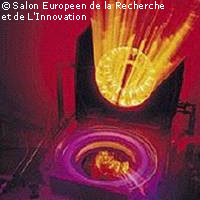Getting scientists out of white coats and into the public arena
At a debate organised at the third European Research and Innovation Exhibition in Paris on 9 June, a panel was asked to discuss the problems faced by scientists and professional communicators in communicating science to the general public. 'The problem is that there is a lack of effective two-way communication. And new technologies such as the Internet have only made matters worse,' said Michel Claessens, Information and Communication Officer at the European Commission's DG Research. 'I think there is a lot of information out there but as regards communication and debate between scientists and society, the situation must be improved,' Mr Claessens added. The Officer then pointed to EU policy on science communication, especially the grant agreement in the newly launched Seventh Framework Programme (FP7), which states that 'the beneficiaries shall, throughout the duration of the project, take appropriate measures to engage with the public and the media about the project.' Sacha Lafaurie, Innovation Consultant at ACIES, a research promotion and management consultancy company, agreed with Mr Claessens, saying that French scientists also needed to communicate better and engage with the public about their work in a meaningful dialogue. Mr Lafaurie said: 'Scientists need to enter into a constructive debate with the public. The old top-down approach where scientists speak and the public listens is truly over.' So for Mr Lafaurie, the issue is that scientists are professional researchers, not communicators. He therefore suggested training courses on media and communication skills to teach scientists how to convey their work in a simple and concise way to the general public. The panel agreed that more media savvy scientists was the way forward for both engaging the public in a dialogue on science and improving the overall image of scientists in society. There is a traditional image of scientists as 'white coats' spending hours in laboratories or 'ivory towers'. It is time now to 'humanise' research, argued Jean-Marc Atlan, President of PR company, Kaelia. 'I think scientists have to take up the challenge of transmitting the wonderment of science and their passion about the subject to the media so as to inspire the new generation,' he said. Indeed, if one of the long term goals of European nations is to get the younger generation interested in science and into scientific careers, then scientists have a crucial role to play, along with the media. According to Jean-Pierre Verjus, Director General at INRIA (national institute for research in computer science and control), 'the problem with the media is its soundbite culture, which makes it hard for a scientist to get a message across in 47 seconds'. Didier Ades, the moderator of the panel and journalist at France Inter, agreed that the media are guilty of not always picking up on interesting science stories because of this soundbite culture and very tight deadlines. However, he argued, scientists know this is the case and could work around these constrictions by making the life of the media easier. 'Not only do we have to familiarise ourselves with the scientific content and verify it, we also need to translate it for the public,' he said. Another problem is that scientists are often reluctant to deal with the media due to a tendency to over-simplify the issues, the journalist added. So the panel agreed that that both scientists and journalists should take a more collaborative approach. In this way, building trust between the two sides could lead to a greater and more accessible debate in France.
Countries
France



